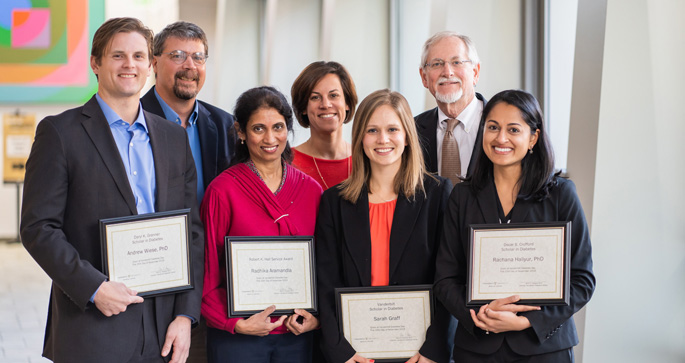
Research in the fields of diabetes, endocrinology and metabolism were highlighted recently during the annual Diabetes Day at the Vanderbilt Student Life Center.
More than 200 faculty, postdoctoral researchers, graduate students, fellows, medical students and staff representing Vanderbilt University, Vanderbilt University Medical Center and Meharry Medical College gathered to share their work and establish new collaborations during the daylong event.
VUMC is home to both a Diabetes Research and Training Center (DRTC) and a Center for Diabetes Translation Research (CDTR), both funded by the National Institute of Diabetes and Digestive and Kidney Diseases (NIDDK). The Vanderbilt DRTC is an interdisciplinary research and training program involving more than 130 faculty from 20 departments. The Vanderbilt CDTR, under the directorship of Tom Elasy, MD, MPH, is a partnership of VUMC and Meharry Medical College, with the mission of applying research knowledge in both clinical practice and in community settings to better prevent and treat diabetes and obesity. VUMC is also home to the Eskind Diabetes Clinic, a nationally recognized facility for adult, pediatric and gestational diabetes treatment with approximately 50,000 patient visits annually.
Diabetes, the seventh leading cause of death in the United States, is a metabolic disease characterized by elevated blood glucose which leads to complications including blindness, stroke, heart attack, kidney failure and vascular disease. The most common form is type 2 diabetes, which occurs when the body becomes resistant to insulin or doesn’t make enough insulin. In Type 1 diabetes, the pancreas produces little or no insulin.
Diabetes has been identified by the World Health Organization as one of the top health challenges facing the next generation. According to the International Diabetes Foundation an estimated 463 million people worldwide have diabetes, a number projected to soar to 700 million by 2045.
“The research you’re doing here hopefully is going to help bend that curve and have an impact on diabetes,” Vanderbilt DRTC Director Alvin Powers, MD, told attendees. “There are challenges for all of us. First, we don’t know what causes Type 1 diabetes, and, by the way, we don’t know what causes Type 2 diabetes. We don’t even know how many types of diabetes there are. With the research we’re doing here and at other places around the world, we’ve got to address that.”
Maike Sander, MD, director of the Pediatric Diabetes Research Center at the University of California, San Diego, was a guest speaker, and she discussed her research on the molecular mechanisms that control the formation and function of insulin-producing pancreatic beta cells.
“Beta cells are very malleable and plastic, and we need to figure out exactly what the switches are that allow these cells to switch back and forth in their states,” Sander said. “Some of these switches might be opportunities for new therapeutic intervention.”
Invited speaker Monica Peek, MD, MPH, associate director of the Chicago Center for Diabetes Translation Research at the University of Chicago, spoke about how an individual’s social environment impacts both their health and the health disparities they encounter. Social research has shown that issues such as poverty, discrimination, substandard housing, lack of transportation, poor nutrition, lack of educational opportunities, residential segregation and community violence have clear connections to health care and health outcomes, she said.
“We call these ‘social determinants of health’ and we are now, as a health system and as a country, willing to think about them and to try to address them within the confines of the health care setting in ways we have not been willing to in the past,” she said.
Vanderbilt Diabetes Day also included several presentations by VUMC faculty as well as poster sessions involving investigators at every career level designed to spur new research engagement.
“Today is about building community,” said Sean Davies, PhD, director of Enrichment, Training and Outreach for the Vanderbilt DRTC. “Cutting-edge research happens when the frontiers of different research areas come together. We can create those types of collaborations by having events like today where researchers from diverse fields have the opportunity to brush into each other and to hear about what everyone’s working on.”
Sander agreed that events such as Vanderbilt Diabetes Day are critical to fostering research discoveries.
“We’re all very specialized in our research, so it’s really important to bring people together that approach diabetes from different angles,” said Sander. “It’s important so we can raise new questions and so we don’t get lost in the detail as we do our work.”
Vanderbilt Diabetes Day was jointly sponsored by the Vanderbilt DRTC and the Vanderbilt CDTR.












